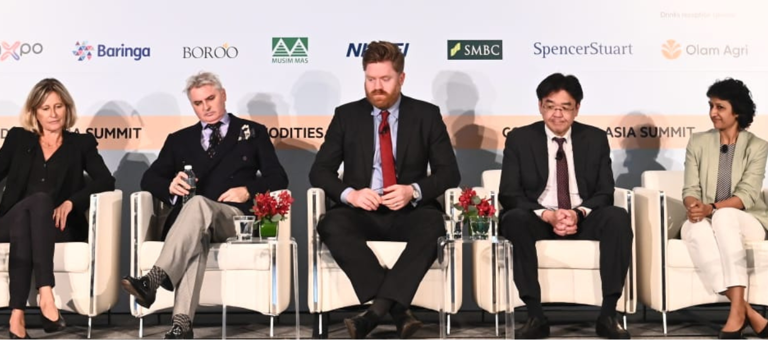
Baringa discusses the role of LNG in the energy transition at the Financial Times Commodities Asia Summit in Singapore
9 December 2022
Baringa’s Peter Thompson spoke at the Commodities Asia Summit in Singapore, an event run by the Financial Times as part of its FT Live programme. Peter joined a panel of experts exploring LNG and its role in fuelling the energy transition, alongside speakers from companies including JERA Global Markets and Vitol.
The Financial Times posed a simple question that will be at the forefront of many people’s minds. For the coming two winters, will there be enough gas to go around, for Europe and Asia? The answer is not so straight forward.
Baringa’s Peter Thompson gave the audience his perspective on the situation as we enter this winter.
The fall in Russian imports has led to a supply gap of over 140 bcm in Europe, with LNG and demand destruction closing that gap in 2022. For 2023 however, an additional ~40bcm of gas may be needed in Europe. Europe entered this winter with close to maximum reserves, but the market will be extremely tight and the sensitivity of risk factors may increase from here.
“A key metric is how much gas is in store at the end of this winter. If it’s too low, it’s almost impossible to imagine a way in which storage could recover to [required levels] for next winter"
Footage provided by Financial Times Live
How long the reserves last will depend, above all, on how cold winter will be, both in Europe and Asia.
With significant demand destruction during the summer, such as fuel switching, there are not many levers left for policy makers to pull to match supply and demand, especially if there is any further supply disruption.
The audience was also reminded that weather is not the only variable in gas supply – other risks remain, including the risk of unforeseen supply disruptions. Peter and fellow panellists also discussed how the crisis could affect the Asian energy transition.
There was a consensus that LNG was going to do the heavy lifting to replace Russian gas, and this would lead to volatility for several years, until new LNG projects could come online in the second half of the decade.
Peter sees the market as two-sided: the spot market which reflects the immediate situation, and the market for long-term contracts. The latter continues to thrive…
“If European players won’t buy long-term contracts because they believe the role of gas will diminish quickly, it will have to pay much higher prices in the spot market. The alternative is to sign long-term contracts, but you may not need it for 20 years.”
Footage provided by Financial Times Live
Finally, in a crisis, it is easy to focus on the immediate term, but the current situation will have a large impact on the long-term future of gas and LNG, for Europe and the world.
“When we emerge from the crisis, the global gas and LNG market will not be the same. Europe will no longer be the global sink, it will be a premium market, and that will see different pricing and trade dynamics.”
Footage provided by Financial Times Live
For more information on the role of LNG in the energy transition contact Peter Thompson or to find out how we are supporting companies across the energy value chain in Singapore and the broader APAC region, reach out to Christian Dose.
Is digital and AI delivering what your business needs?
Digital and AI can solve your toughest challenges and elevate your business performance. But success isn’t always straightforward. Where can you unlock opportunity? And what does it take to set the foundation for lasting success?